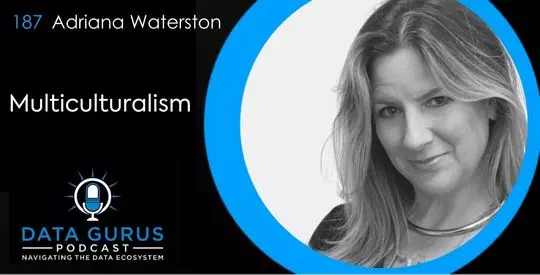Podcast: Play in new window | Download
Data Gurus – Episode 187 – Multiculturalism, with Adriana Waterston
Adriana Waterston is Sima’s guest for today’s podcast! She is the Chief Revenue Officer and Insight and Strategy Lead at Horowitz Research.
Multiculturalism is an important matter that has become a focal point for society in recent years. At Horowitz Research, they specialize in multicultural research.
Adriana joins Sima today to talk about what they are doing at Horowitz Research. She also gets into the concepts of culture and multiculturalism and discusses various issues related to multiculturalism.
The origin of Horowitz Research’s focus on multicultural research
Back in the mid-1980s, when Horowitz was focused on helping the nascent cable industry, they addressed the question of who would pay for television when television was free. That brought to light that multicultural people- especially black and Latinx individuals, watched the most television and were willing to pay for it. Yet, at the time, cable companies redlined black and Hispanic neighborhoods. So, in addition to their general market work, Horowitz also began to advocate for multicultural audiences and consumers, urban markets, international audiences, and foreign language-dominant communities.
Census 2000
The 2000 Census led many people to understand that America would eventually become a multicultural majority country. Adriana joined Horowitz Research in 2001. She is Latine and is fully bilingual and bicultural. Around the time she joined the company, people were starting to talk about multiculturalism in a way that had never happened before. So she began digging into the company’s data on multicultural audiences and developed a passion for it.
Multicultural research
As the company evolved and conversations about multiculturalism became more relevant and important, Horowitz became known for their thought leadership and advocacy for multicultural communities and audiences and their work in cultural insights.
Culture
Culture is not static. It is a very fluid and personal concept. It is about the meanings people attach to traditions, objects, experiences, places, and religious activities and the feelings they get from participating in those experiences.
Challenges
People are multi-faceted, and there is a lot of diversity in every community. A challenge that many marketers face when targeting different groups of consumers is the fluidity of the cultural groups into which people fit.
Unlearning
Recently, Horowitz has been focusing on helping marketers and content providers unlearn their old ways of reaching different segments and encouraging them to view everyone as part of a broader community.
Horowitz’s message
Horowitz’s message for marketers and content providers is that everyone’s story is unique yet universal. The more they can understand that, the better the job they can do.
Understanding the value of diversity, multiculturalism, and multilingualism
Many next-generation people growing up in immigrant communities in America complain of feeling underestimated because they have darker skin, an accent, or a Hispanic last name. In some, that feeling and experience may even open them to overachieving. Fortunately, the United States is now in a very different place in terms of understanding the value of diversity, multiculturalism, and multilingualism.
Maintaining a connection
The evolution of communications and travel has made it a lot easier for immigrant families to maintain a connection with and revisit their home countries than it was in the past. That strengthens people’s cultural connections and language skills and helps them stay connected with the food, music, and other ways of keeping their cultural traditions alive.
Mixed culture families
There is a growing number of mixed culture and mixed-race families, but people still tend to stay connected to people in their communities. Over the next few generations, however, we are likely to see an increasing number of mixed-culture, mixed-race, and mixed-ethnicity families.
Opening doors
Doors are opening for more and more people to participate in spaces of power in the United States. That change will go a long way toward shifting power and helping this country become the diverse Mecca it ought to be.
Links:
Email me your thoughts
Sima@Infinity-2.com
Adriana Waterston on LinkedIn
Horowitz Research on Twitter




